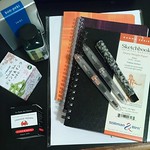
That vs Which
06/25/2011Back in the olden days when people flipped through real dictionaries, trivia might lay undiscovered what with the distance from one letter to another being so very far with facts buried deeply in delicate pages crammed with tiny print. No search engines or the “Find” command? Horrors!
The crinkle and whoosh of turning pages may soon be forgotten, but Dictionary.com does make finding trivia easy so here are some tidbits for the usage buffs.
The relative pronoun which refers to inanimate things and to animals: The house, which we had seen only from a distance, impressed us even more as we approached. The horses which pulled the coach were bay geldings.
That is used to refer to animate and inanimate nouns and thus can substitute in most uses for who(m) and which: Many of the workers that (or who) built the pyramids died while working. The negotiator made an offer that (or which) was very attractive to the union.
I like this bit best:
Experienced writers choose among these forms not only on the basis of grammar and the kind of noun referred to but also on the basis of sound of the sentence and their own personal preference.
In other words it is the writer’s domain and there are no rules. Do whatever you like!










Margana,
I respectfully disagree. This is actually one of my grammatical pet peeves. According to Strunk and White’s Elements of Style, “which” is used in parenthetical phrases, while “that” is used when the phrase following “that” is critical to the meaning of the sentence.
For instance:
The river, which is called the Seine, flows through Paris.
The river that flows through Paris is called the Seine.
LikeLike
Then there’s William Zinsser in On Writing Well who writes, “Anyone who tries to explain “that” and “which” in less than an hour is asking for trouble. Fowler, in his Modern English Usage, takes 25 columns of type. I’m going for two minutes…”
Following a page of examples, a seeming preference for using “that”, and one use of the word “probably” attached to using “which” when a comma is needed, he ends with, “That’s all I’m going to say that I think you initially need to know to write good nonfiction, which is a form that requires exact marshaling of information.”
I remain amused.
LikeLike